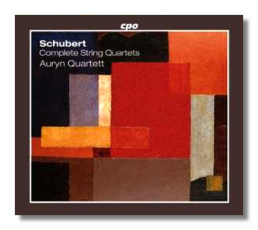
The Internet's Premier Classical Music Source
Related Links
- Schubert Reviews
- Latest Reviews
- More Reviews
-
By Composer
-
Collections
DVD & Blu-ray
Books
Concert Reviews
Articles/Interviews
Software
Audio
Search Amazon
Recommended Links
Site News
 CD Review
CD Review
Franz Schubert

Complete String Quartets
- Quartet for Strings #1 in G minor, D. 18 (1811)
- Quartet for Strings #2 in C Major, D. 32 (1812)
- Quartet for Strings #3 in B Flat Major, D. 36 (1812)
- Quartet for Strings #4 in C Major, D. 46 (1813)
- Quartet for Strings #5 in B Flat Major, D. 68 (1813)
- Quartet for Strings #6 in D Major, D. 74 (1813)
- Quartet for Strings #7 in D Major, D. 94 (1812)
- Quartet for Strings #8 in B Flat Major (Op. 168), D. 112 (1814)
- Quartet for Strings #9 in G minor, D. 173 (1815)
- Quartet for Strings #10 in E Flat Major (Op. 125/1), D. 87 (1813)
- Quartet for Strings #11 in E Major (Op. 125/2), D. 353 (1816)
- Quartet for Strings #12 "Quartettsatz" in C minor, D. 703 (1820)
- Quartet for Strings #13 "Rosamunde" in A minor (Op. 29/1), D. 804 (1824)
- Quartet for Strings #14 "Death and the Maiden" in D minor, D. 810 (1824)
- Quartet for Strings #15 in G Major (Op. 161), D. 887 (1826)
Auryn Quartet
(Matthias Lingenfelder & Jens Oppermann, violins; Steuart Eaton, viola; Andreas Arndt, cello)
CPO 999660-2 6CDs
Schubert wrote lieder. Schubert wrote songs. Everything he wrote has that singing essence to it if it is played right. From the opening of the first quartet (D.18) you can hear Schubert's voice. This melody is nothing that would come from Beethoven. While there are moments throughout the piece that may bring to mind late Beethoven, there is that lyrical, singing line that is strictly Schubert. In fact, Haydn comes more to mind than Beethoven as I listen to these pieces.
The playing here is definitely "romantic" in its realization. I was especially taken by the playing of the cellist. He has a tactile, earthy smell to his playing. Much of this is new to my ears, but I did have a chance to make some comparisons with the "old" Tokyo quartet recordings on RCA. I consistently preferred the Auryn sense of balance (or "relief" as Stokowski put it) over the Tokyo. The voices are more defined, there is more of a sense of dialogue with the Auryn. The Tokyo group is certainly fine, but there seems to be a distance between them and the meaning of the music. I also listened to a Teldec recording with the Vermeer Quartet of the "Death and the Maiden". The CPO sound is so much better that you can't really compare the two performances. The sound is deeper, richer and fuller on cpo.
When I listen to their playing of this music by the Auryn, for some reason a Socratic dialogue comes to mind, "The Symposium". Now this is not a literal connection, it is more of essence. In fact, I picked up and read the dialogue as I listened to all six hours of the music. I can think of no better way to listen to these musical dialogues.
The sound here is just absolutely audiophile, which I already mentioned. At moments I felt as if the quartet was playing in my living room. The sound stage is perfect.
The notes are a bit dry but not technical and offer some educational insights into the composition of the music. I'll not elaborate here, but will tell you that I learned to differently appreciate the music than before having read them.
The six CDs are at the asking price of $53.99. That is less than $10 a disc. The notes are good. I can't imagine a better, economical way to be introduced to this music. In fact, I think it will be a long time before I hear better performances. What else can I say? Highly recommended.
Copyright © 2000, Robert Stumpf II


















